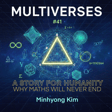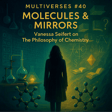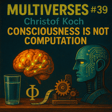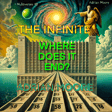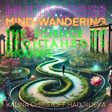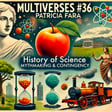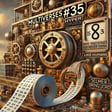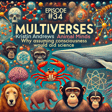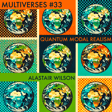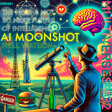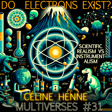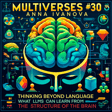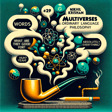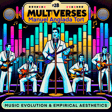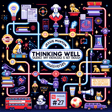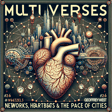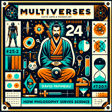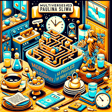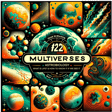The Uncertainty of the Canterbury Tales Text
00:00:00
Speaker
Hello. Students of English are often given set texts, and one classic set text that many, many people will encounter is the Canterbury Tales. But unusually, this text is not very set. In fact, we don't really know what the original text of the Canterbury Tales was, or even if it's right to think of the Canterbury Tales as a text at root.
00:00:30
Speaker
My guest this week is someone who can help us understand these questions.
Evolutionary Analysis of Manuscripts
00:00:34
Speaker
Peter Robinson is a professor of textual scholarship. He's perhaps best known to the world for his pioneering use of evolutionary technology, so the science of phylogenetics, and applying that to the manuscripts that we have of Canterbury Tales, which are a kind of heterogeneous bunch
00:00:57
Speaker
many different manuscripts with slightly different versions of the Canterbury Tales. Using the techniques of evolutionary biology, Peter has managed to create family trees of those manuscripts. So exactly the same science that allows us to trace how genes propagate through generations allows us to see how versions of this text propagate through the hands of different scribes.
Chaucer's Multifaceted Life
00:01:27
Speaker
So that's what Peter is perhaps best known for generally. However, to me, he is certainly best known as my dad. So it's not a pure coincidence that we share a second name. So it's a very great pleasure to speak to him this week. And I think I learned more about what he does for a living, or has done indeed for the last several decades, that I managed to glean from the kitchen table.
00:01:55
Speaker
So with that, we're going to learn about who Chaucer was, a man who led many lives. We're going to learn about textual scholarship, a discipline that looks at texts as texts, as physical documents. And we're going to muse on several things. So I hope you enjoy.
Multiverses in Literary Interpretation
00:02:17
Speaker
Hi, Peter Robinson, welcome to Multiverses. Thank you for joining me. I'm hoping to get into a question which I think is very nicely related to the theme of this podcast. So Multiverses evokes the idea of branching, but it also has a little pun in there around poems and verses and so forth. And we're going to talk a little bit about the Canterbury Tales and how there's a textual tradition in which we see some echoes of this kind of branching.
00:02:47
Speaker
I think before we get into the details of this, we probably need to remind folks or inform folk, what was the Candy Boo Tales? Who was it written by? So perhaps we can start there, and then I think we'll get into some surprising applications of the science of genetics.
Chaucer's Diplomatic and Aristocratic Background
00:03:05
Speaker
Who was Chaucer? What's it going to be tells? Right. Who was Chaucer? Well, the multiverse thing is actually, I hadn't thought of it this way, but I think actually multiverse is a really interesting way of approaching Chaucer because he lived multiple lives. And you could argue that each life was a multiple multiverse, a single multiverse or one universe or one verse or something like that. And he was a poet. So yes, very neat that versus gets into your title there, particularly for Chaucer.
00:03:35
Speaker
So who was he? Well, one answer is that he was a member of the merchant aristocracy. His father sold wines to the court of Edward II and became very prosperous as a result. So he was brought up within the aristocracy. That's one life. Second life, he was
00:03:56
Speaker
diplomat. He was an extraordinarily gifted man. It's quite clear. He learned languages easily. It seems that he spoke French, Italian and Spanish fluently and wrote also very good poetry in French as well as English.
Historical Context of Chaucer's Life
00:04:14
Speaker
And he might have written some poetry even in Italian, though we don't have any instances of that. He certainly read Italian. So that's the second Chaucer. I think the
00:04:23
Speaker
the person of language is the educated man who'd read very widely. Third Chaucer, which comes from the second Chaucer, was that he was a diplomat and a highly trusted and favoured member of the circle around Richard II particularly.
00:04:45
Speaker
and to agree also close to many of the court, not so much with Edward II himself, but many of the courtiers of Edward II and his brothers particularly and his sons, especially his sons, which was most famous as the Duke of Lancaster and John of Gaunt, Tors was very close to them.
00:05:07
Speaker
So he was, so going through all those things, yes, he was many, many different things. And this was around, so just to make sure the relevance of this will become clear later. So this was around sort of 14th century, right? That he was living. Yeah, the key dates is he was born around 1340 and died in 1400.
Chaucer: Civil Servant or Poet?
00:05:32
Speaker
which spanned a particularly turbulent period in this particularly turbulent history, as there was effectively several revolutions took place during Chaucer's maturity, and Chaucer had a central place in both revolutions. He was neither, so he was not directly affected or hurt or damaged or advantaged by those revolutions, but he lived through them. So the historical
00:06:01
Speaker
storms that went on in Chaucer's life. His closeness to the court, to some of the most powerful people in England, all of those things became a factor in his poetry, which of course is what we remember him by.
00:06:15
Speaker
Though probably if you'd asked somebody in the 1390s what they thought of Chaucer, they said, oh, he's a very important guy. He does this. He looks after the tower of London. He looks after all the king's properties along the Thames. He arranges tournaments. He has to pay off all the workmen who work on the tower. They probably wouldn't have thought of him as a poet. They would have thought of him as more like a civil servant, a member of the aristocracy, a man of influence. An influencer.
00:06:39
Speaker
So there are many different Chaucer's, and that is actually, I think, very much reflected in his poetry, which is quite extraordinarily varied, and particularly in the work that we all know Chaucer by, The Canterbury Tales, because The Canterbury Tales is really many works in one.
Performance vs. Manuscript Tradition
00:06:59
Speaker
It's some way to think of it. It's actually 24 long poems put together. Chaucer's original plan was to write 120 or so. He actually wrote 24, which is not bad, pretty substantial.
00:07:10
Speaker
But it's a poem made of many poems, I suppose, perhaps, as you say, reflecting all the variety in Chaucer's life and interests. And as we've established, Chaucer was living in the 14th century, so this is before movable-type printing. And this puts us in a time where
00:07:31
Speaker
The technology of writing was completely different to what it is now. And I don't even know if it's correct to think of Chaucer as a writer. I mean, did he actually, when he came up with the Canterbury Tales, would he have physically penned it or would he have sort of thought it through in his head and read it out aloud? Do we know how that worked? Right. Well, you raise a whole bunch of questions here. And again, following through the multiverse idea, there are multiple.
00:08:01
Speaker
instances of ways of thinking of Chaucer as an author. And probably, and some of the ideas of what we think of as an author don't really apply in the Middle Ages. As you said, we don't have print. So we don't have the whole publication kind of chain, which we're used to. Chaucer did not go to somebody like Bloomsbury Press and say, would you publish this? And then they publish a print and whatever like that.
00:08:29
Speaker
So we're living in a manuscript culture and that means that we are living also in an age when Torsa's first readers will be people he knows personally.
00:08:44
Speaker
And we also got the question of what you've rather well put out there, is that did he actually write it? How did people experience it? We know that people didn't buy Canterbury Tales in a book as you do now. They got, how did they get it?
00:09:00
Speaker
And in fact, what we have is a very great deal of evidence that texts were commonly disseminated by performance or reading aloud. And there's not a clear division between reading aloud and performance either.
00:09:19
Speaker
So books were such rare objects. I mean, they're extraordinarily expensive. A manuscript book would rep a single manuscript book would represent several years of labor. So think of a manuscript book as being worth several hundred thousand dollars. That's really kind of compared to the average wage of a penny a day. A manuscript book will be 30 shillings.
00:09:41
Speaker
or maybe probably at least three pounds or so, which is, what is that, 720 pennies. That's two years work for your labourer. So books were, and even after readership became quite widespread, even in the early ages of print, books were still very expensive, but much more so of course in the 14th century when
00:10:05
Speaker
literacy rate ceiling were probably around about 25% of the population could read, which meant that the great majority of the population had to get knowledge from word of mouth.
Oral Tradition in Chaucer's Time
00:10:18
Speaker
And I think one of the things that we've become very convinced about, very clear about, is that what we have in the manuscripts of the Canterbury Tales isn't anything like
00:10:30
Speaker
a fixed text to put a sort of a kind of, it's more complicated even than that, but you cannot believe, you cannot think of this as being the author writes this out in a fair copy in a fair hand and then it goes for a process and it's printed and proofs come back to the author and they go back to the printer and then the printer prints it. There isn't anything like that. There is some analogies with it, but it's
00:10:56
Speaker
But in fact, one of the key factors here is, I think, the production of the poetry for an audience who encountered it first through either recitation or being read to from books. So I think that takes quite a bit to consider how different is your experience of a text when your habit is not to read. Now,
00:11:21
Speaker
for centuries, the default way of acquiring knowledge is to get it from a book. That was not true in the Middle Ages, even when books were available, and even when people had access to books. Still, most of the time, the knowledge would come through your ears, into your brain that way.
00:11:37
Speaker
Yeah, it's interesting. We were just speaking just ahead of starting this call about Audible and how actually in some ways that the pendulum might be swinging back a little bit. And here we are on a podcast as well with hopefully some knowledge passing through listeners ears.
00:11:55
Speaker
But I guess with Audible in particular, it's still within that paradigm of a fair copy, an edited, produced thing that then there is a single unit. It gets played back. OK, there might be different versions of different actors. But it's not in the same idea of performance where presumably
00:12:22
Speaker
each performance might be slightly different. I guess what comes to my mind is perhaps the closest thing that we have currently is something like stand-up comedy, where performers will be iterating their routines. And we never think about even most people would never dream of reading a stand-up comedian's transcript, right? That's just not fun, right? And what does it even mean to have such a transcript when we know that each performance is going to vary?
00:12:51
Speaker
And perhaps that's displaying more variation than there was as applied to the Canterbury Tales, but maybe that's putting us in a better place to think about it. Right, I think the analogy to stand-up comedy is actually really valuable.
00:13:09
Speaker
and rap and hip-hop and the like. There's actually a rather really brilliant performer, Barbara Brinkman. I don't know if you've come across any of his work with Chaucer. And you should get him on your podcast talking about performance in Chaucer and medieval texts.
00:13:26
Speaker
And that I think that's that kind of performance. And stand up isn't far off to the stand up comedians don't completely improvise at all. They prepare. And then what comes out might differ from one performance to another. But there is a sort of core about it. And then it's I think you come to analogy something like the the theories of
00:13:56
Speaker
of how oral tradition, oral formulaic literature developed. So I think if you come to some sort of cross oral formulation of literature, as has been very well established with analysis of Homer and the like, that the Homeric poets constructed East performance by having in their head an enormous, large arsenal of phrases and words, which they brought out slightly differently each time. And there's an immense amount of study about this.
00:14:24
Speaker
Celtic tales, who were captured in the early 20th century, telling folk tales in Ireland. It was the same sort of process. So it's a different kind of dynamic altogether, but I think what's central to Chaucer
00:14:40
Speaker
Is that a performance quality of the work? We know there's one famous front piece in a manuscript in Trinity College Cambridge of Chaucer apparently reading to court. Or there's a book on the lectern in front of him, but he appears not to be reading it. He appears to be performing.
00:14:59
Speaker
We've had some considerable success ourselves in re-enacting how these performances might have looked. I had a superb student a few years ago who memorized hundreds of lines, thousands of lines of the Canterbury Tales and then performed it, I think very, very effectively. There are so many signs in the Canterbury Tales that
00:15:20
Speaker
so much of its dialogue, its speech. And it's clear that whoever performed this did the voices, didn't just present a reading, but actually it was a performance. And I think it's the nearest analogy I can think of. It's much closer to Shakespeare's plays in that sense. And the records we have of Shakespeare's plays are records of performance. And that realization has actually transformed the editing of Shakespeare in the last 20, 30 years and the production of Shakespeare's with it.
00:15:50
Speaker
And I think we're seeing the same sort of thing happening with the Canterbury Tales, particularly then that Chaucer appears to be moving much more towards an idea of one-man performance, like stand-up with multiple voices. And of course, what we don't have is any videos of Chaucer doing it. We don't have a script. What we have is a bunch of texts, which is another problem.
00:16:17
Speaker
But that's right. I guess what we have distorts a few things, but it's all we have available, right? Apart from, you know, I guess these clues as to how the performances would have worked.
00:16:33
Speaker
But it's interesting, as I suspect most people would think of the Canterbury Tales primarily as a text, but it seems like maybe the best way of us thinking about it is a performance. But nonetheless, that performance hasn't been passed down to us. At some point it was put on ice, as it were, and what we have left is
00:16:56
Speaker
a text or indeed many different texts. And this is where I think your work with the Canterbury Tales project comes in. So perhaps you can, if you take us through, you know, what are the fragments of the Canterbury Tales which did make it through the five centuries to us and the mystery that they left.
The Fluidity of Authorship
00:17:20
Speaker
OK, yes. This is the third thing. What do we actually have? What we actually have is 84 manuscripts written in multiple hands over about a period of around about 100 years, from between 1400, perhaps 1398, and 1500 when we get the first print editions of Chaucer.
00:17:41
Speaker
So those 84 manuscripts, and indeed the four earliest print editions of Chaucer, are the best test and enemy we have to what words Chaucer might have actually spoken in front of the court, reciting his latest work, The Caterpie Tales, as I think probably that's I'm pretty sure that's actually what happened. There's every sign that Chaucer
00:18:07
Speaker
prepared the text for that kind of recitation, and then it was written down after that. So we have 84 manuscripts, and not one of these manuscripts has something saying, this is my work. I am Geoffrey Chaucer, and I write this work out by hand in my own word, in my own hand. This is my text. I've established it. Actually, other media authors actually did that.
00:18:30
Speaker
even in the age before culture. Petrarch, for example, went to considerable trouble to control precisely the exact words of his text. Chaucer actually doesn't seem to have cared very much, which is slightly upsetting. And again, a very nice analogy with Shakespeare. It's probably not true that Shakespeare simply didn't care about print either. I think he probably did. But Chaucer and Shakespeare are both on the kind of
00:18:57
Speaker
that kind of side of creativity, which says, you know, I'm creating this thing, I'm making this thing, I enjoy making it, people enjoy listening to it. I don't care that much about getting it into print, or in Chaucer's case, we'll define meniscan form.
00:19:13
Speaker
a kind of Creative Commons, early CC 2.0 advocate, maybe, right? Happy for his work to be remixed. It could be. And again, in the bulk of this is the thinking of who Chaucer was. He was not a professional poet. He didn't depend for his livelihood on his approach.
Chaucer's Financial Stability Beyond Poetry
00:19:33
Speaker
Other poets actually in manuscript world, the medieval world, they were quite not commonly, I would say, but they were certainly
00:19:44
Speaker
a number of individual poets throughout Europe and authors who lived by what they actually wrote. Macaccio, maybe Dante to a degree, certainly John Garch was contemporary in England, but Chaucer wasn't. He was a civil servant, very powerful civil servant. He couldn't have a sort of major, a member of the cabinet. And he wrote poetry in his spare time, as it were.
00:20:11
Speaker
So this is a factor that he didn't have a felt need to create his own oeuvre, as it were, and to be the custodian of it, and to supervise its going out into the world. We do actually happen to know quite a lot about how Chaucer
00:20:32
Speaker
where he was when he was writing the poetry, what conditions of life he was living in, physically even the exact place down to the millimetre where he lived while he was writing much of his poetry.
00:20:44
Speaker
an all date in London. He lived above the Tower Gate all day because he was acting as a huge collector of customs for the bull trade in England, which doesn't sound like very much, except you think that one-third of the King's income came from the taxes levied by Geoffrey Chaucer, which makes him a pretty significant figure just in his own right for that. But because he wasn't professional, that has a lot of effect on the way in which the Canterbury Tales has come to us. It seems that Chaucer didn't, and he died
00:21:15
Speaker
He was 60 years old when he died, which is certainly beyond the average lifespan of most people. But it appears he died quite suddenly, and some men may be unexpectedly.
Piecing Together Chaucer's Legacy
00:21:24
Speaker
There's even a theory put out by my one-time colleague and friend Terry Jones that Jeffrey Chaucer was actually murdered. And there is actually some evidence for that, for the support that he was on the wrong side of the new King of England in the fourth and may have been murdered.
00:21:43
Speaker
But in any event, Chaucer never put the Canterbury Tales into an order, a considerable order himself. The best expression of this was called the Missy Desk Theory. When Chaucer died, he left behind a missing desk with all this stuff all over it. And these poor people, his literary executives, his friends who knew about the Canterbury Tales, loved the Canterbury Tales, which become, even before his death, pretty famous.
00:22:10
Speaker
they had to try and put together, piece together what Chaucer left behind him. And we're carrying on that process of trying to piece together what Geoffrey Chaucer left behind him.
Scribe Identification and Manuscript Origins
00:22:20
Speaker
You're still cleaning up the desk. And on this desk we have, was it 84 manuscripts or so? None of them, as you say, carrying Chaucer's official stamp of approval. And perhaps none of them even, I don't know, possibly never even seen by Chaucer, we don't know.
00:22:41
Speaker
What is the process, right? Firstly, what are we trying to find from these manuscripts? Well, what we would like to find is something as close to my mind, what Chaucer would have performed when, say, somewhere in 1389, he came back to court in London. Richard II, the King of England, who had just regained power himself by basically a counter coup,
00:23:09
Speaker
against his relatives who had taken power off him. So Richard II took power back. One of his first acts was to bring Chaucer back. This was probably June 1389.
00:23:19
Speaker
And we believe that in just that period Chaucer had spent the last four years beginning to write the Canterbury Tales between 1385 and 1389, or 1386 probably around 1389. And the rationale for that was that in 1386 Chaucer suddenly lost his powerful position as Collector of Customs for the Port of London, or rather he resigned it. And the reason he resigned it is pretty clearly there was a coup against Richard II and the
00:23:48
Speaker
And Richard II's vicious, nasty, horrible relatives took over, basically, and proceeded on a campaign of slaughter, of judicial murder, of as many of Richard II's friends, colleagues, tutors, et cetera, associates as they could manage. And Chaucer got out of London because of that. So Chaucer came back to London in 1389,
00:24:16
Speaker
We've in our reconstruction of this.
00:24:20
Speaker
He presented the Canterbury Tales as a series of performances. He wrote the Canterbury Tales out, but the core was the performances. And then the manuscripts are kind of a record of those performances, if you like. They're like a snapshot of what was going through Chaucer's mind at one particular moment, which might have then underlay a particular performance. We have, in fact, several manuscripts dating from very close to Chaucer's own lifetime.
00:24:49
Speaker
including one which we think may have been started within his own lifetime, and several others which were written, and a couple of major ministers which were written by a person who we think was short-subscribed for a period of some 25 years or so.
00:25:08
Speaker
There's been a brilliant piece of literary detective work by Lynne Mooney. I don't know if you remember Lynne Mooney, who visited us at various times back in the past, and she established that, I think, pretty soundly.
00:25:24
Speaker
that a guy called Adam Pinkhurst worked for Geoffrey Chaucer as a scribe in the customs house from 1375 to about 1385 and then worked for Chaucer again around 1390 to 1400.
Analyzing Manuscript Dates and Textual Intentions
00:25:36
Speaker
And that he copied that the first, the oldest copies we have of the Canterbury Tales or the old single copy we have of the Canterbury Tales was written by Adam Pinkhurst Chaucer's associate and scribe. And we have that manuscript.
00:25:52
Speaker
that's in the National Library of Wales, the Henggud manuscript. So that's the kind of most precious single manuscript we have. This may well have been supervised by Chaucer, that part of his writing may have been supervised by Chaucer himself. At the very least, the manuscript was put together by somebody who knew Chaucer's writings and had access to all the documents that Chaucer had left behind, and himself was actually responsible for writing out those documents.
00:26:18
Speaker
So the Henget manuscript is written by this scribe very close to Geoffrey Chorz himself. OK, I think I want to just check on some things to make sure that we've not lost anyone, myself included. So we have these manuscripts which are almost like recordings, possibly, of these performances in a way, and perhaps supervised by Chaucer after the fact.
00:26:46
Speaker
We have this Hengert manuscript. How do we know that it's the oldest of the bunch? And actually, before we get to that, I want to maybe point out something that may or may not be obvious, but just that the reason we care about figuring out which of these manuscripts is the one closest to those performances
00:27:09
Speaker
is that the manuscripts differ, right? They're not exact. We have 84 manuscripts, which are not just physically different objects. They have different words written on them. They have different letters. They have very slightly different versions of the Canterbury Tales. And so what we're interested in, I suppose, is finding which of these was closest to the one that was read out in the court, or maybe not read out, but performed in the court. Right.
00:27:39
Speaker
Yep, that's exactly so. We have one manuscript probably written towards his lifetime. We have maybe another half dozen manuscripts written within 10 years of his death. And then from 1410 to 1420, we get more and more manuscripts. As we come closer to print, the number of manuscripts being copied dramatically increases in preparation, as it were, for print. So around 1460, 1470, we're getting 20, 30 manuscripts written.
00:28:08
Speaker
And they all differ from each other. And as you say, we could, and many scholars have just said, let's just take one manuscript, the Henggud manuscript, and another manuscript by the same scribe.
Finding Chaucer's True Voice
00:28:18
Speaker
And we could allow them to completely define the text of the Canterbury Tales. But we could ignore all the others.
00:28:25
Speaker
But actually, we decided some time ago that we didn't want to do that. We wanted to look at all the meniscus of the Canterbury Tales. And one of the reasons for that is it's possible that a much later meniscus might actually preserve a very early version.
00:28:41
Speaker
And that is actually the case. We think that there were at least two manuscripts. We have one manuscript written around 1450 or so, which we think is a copy of another manuscript written by the same scribe as the guy who wrote the Hingat manuscript, probably around about 1400, but it's not a copy of that manuscript. So this is actually very important. We have this much later manuscript as a check on the earlier manuscript.
00:29:06
Speaker
So when they differ, then we have an interesting puzzle. And there are various pulses in the text where the Henggert manuscript has a mistake. It doesn't make sense. Or there's a gap. There's hundreds of lines missing. There's a whole tale missing, in fact. And the order of the tales in the Henggert manuscript appears to be not as intended by its author.
00:29:30
Speaker
It appears to be rather random at some points, but pretty random. So we don't get all the answers from one manuscript. And that means we have to look at the whole lot of them, which means looking at all 84, which is kind of fun. So how does that process work? You have 84 manuscripts coming from a larger population of manuscripts.
00:29:54
Speaker
which you don't have, right? Which are lost. But you're trying to find which of these of the extant ones is, I guess, again, closest to what would have been performed. But among all this mess of, you know, here's some stuff which looks very suspects. This just doesn't make sense in the Henget manuscripts.
00:30:19
Speaker
know, perhaps some quite obvious things, which are pointing to the fact that Hangar, though the oldest, may not be the best. Well, I mean, what clues or what is the process for trying to piece things together? And instead of just, I guess, relying on scholarly intuition, trying to flesh out, right? Right. What do we take from each of these interviews? Yeah.
00:30:46
Speaker
Well, there are two parts of the answer. One part of the answer is to look at each manuscript very closely itself to discover what one can about when it was written, of all things, where it was written, who owned it, where it came from, et cetera. And those are critical questions because, as you said, we are able to establish that the Hengen manuscript is probably written around 1400 because the handwriting is very distinctive.
00:31:14
Speaker
And one can compare that document with other documents written at the same time. And you can see handwriting changing. And you can see the particular handwriting in that manuscript can data quite reliably within about 10 to 20 years or so. And there's a whole science of handwriting analysis. Maybe it's an art, maybe it's a formal witchcraft. We're not quite sure what it is really.
00:31:40
Speaker
But it's unquestionably true that you can compare the meniscus, compare date, dogmas, you don't know the date itself, with dogmas that you do know the date itself, and then you can get a good idea of the age or the particular document. There are also many other hints, things like fashions change in the skins are actually used, they change the way meniscus is set out.
00:31:59
Speaker
That changes also, so there are a lot of hints within the manuscript as to its age above all and sometimes also its place. You can also use the spelling of the manuscript, the dialects and so forth, to give you a sense of where the manuscript came from. That's one factor. The second factor is, which I think is what you're driving at here, is comparing the actual words of the text and then trying to figure out from the way in which the words differ how the manuscripts relate to each other.
Phylogenetics in Textual Analysis
00:32:27
Speaker
And that's been our particular, my particular area of concentration over the last 30 or so years that we have been developing new ways of finding out how manuscripts are related to each other based on the analysis of the words they have in common and don't have in common.
00:32:48
Speaker
So, which is, I think, where you were driving it when you mentioned phylogenetics earlier on, which is probably my signal most, you know, the contribution most people associate me with, I think, in terms of study of the Canterbury Tales. Myself and a few other people way back in the 1990s discovered that one could take different, the different manuscripts, one could transcribe their text into electronic form.
00:33:17
Speaker
So basically produce Word files or something like that of each manuscript, recording the actual text line by line, word by word, in each manuscript. You can then compare those transcriptions, those representations, the text of each manuscript, and you can create a record of how the manuscripts actually differ.
00:33:39
Speaker
So, the first word of the Canopy Tales is with Islam, one that I've read with a short sort. Now, many manuscripts have, some manuscripts have Avril, some manuscripts have April, okay? So, which manuscripts have Avril, which how many manuscripts have April?
00:33:56
Speaker
And it goes on from that. We find that same pattern of happening. Beginning of the Reeves tale, we're told that somebody was living in Cambridge. In other manuscripts say Canterbury. So there's that kind of difference. It describes maiden mistakes. And scribes introduce changes. So the manuscripts differ because of those changes. What a large part of our work has been is to try to discover
00:34:26
Speaker
how they relate to each other based on how they differ from each other. What are their family relationships? Can we use those family relationships to explore how the text develops over the 100 or so years and through those 84 manuscripts? And this is why, I guess this is where phylogenetics comes in, because as you say, there's a family relationship and phylogenetics is the study of
00:34:53
Speaker
I guess the inheritance of trades. And we can think of these, what's key here is that the scribes introduce changes that then get copied by other scribes. There's a possibility that they get reversed, which doesn't happen very often in genetics, certainly, like you just get
00:35:18
Speaker
branch is dying out if a trait that's acquired is very unpalatable or unfit. Here I can imagine you do get cases where changes are reversed, but that's perhaps unlikely. And if it never happens at all, then you get something which I guess is a
00:35:40
Speaker
a tree in the sense of graph theory, where you have, or perhaps a forest, if you have different, among these 84 manuscripts, you might have multiple trees growing, as it were, where the nodes of the tree, each node is a manuscript. And each manuscript can give rights to other nodes, or another node at least, which is a copy of that manuscript, which might introduce some changes and typically will.
00:36:11
Speaker
And this kind of flow, it's a perfect ranting structure. There's no kind of a cycle of matrices and things. It is a great example of a tree. And using that, you can, and this makes it sound very easy, you can run some analysis to figure out, okay, well, what does this tree look like given all the changes that occur?
00:36:37
Speaker
I guess one key problem is I looked this up just before this call. There's a lot of ways that you can arrange 84 nodes into a tree structure. There's probably even more ways that you can arrange them into a forest structure. I think there's a formula called Cayley's formula. I don't know if you've come across this, but the formula is, I think it's, I'm just gonna look it up so I don't get it wrong. That's it, two to the, here we go.
00:37:09
Speaker
n to the power of n minus 2, where n is your number of nodes. So for 84, that works out as basically 10 to the power of 158, which is 10 with 158 zeros. That's a big number. Yeah, no, you've traversed a whole bunch of questions here. But first of all, my kind of breakthrough moment with all this work came
00:37:38
Speaker
just over 30 years ago now when I started working on this sort of material and I hadn't heard of phylogenetics when I began this whole process. But it turns out
00:37:49
Speaker
that the history of the analysis of texts and the history of the analysis of organisms are actually very parallel and actually interlock. And the key moments in both are the mid-19th century when, of course, Darwin writes the origin of species and with the immortal line about descent with modification as being the model that explains the entire development of every living thing on the planet. And probably possibly, indeed, very likely in the universe, in fact.
00:38:19
Speaker
But at the same time, the Dom was developing that theory of the relationship between organisms.
00:38:23
Speaker
Textual scholars, most famously under German scholar Karl Lachmann, were working on texts like the Bible, texts like the Middle High German Nibelungen Lied and Arthurian romances and so forth. And they were discovering that texts could be arranged into families on the basis of characteristics, on the basis of particular readings they shared and didn't share.
Challenges in Reconstructing Original Texts
00:38:51
Speaker
Darwin had exactly the same perception when it came to organisms. So the roots of both textual scholarship, the sort of work I do, and what biologists do is actually based on a single perception of descent with modification using the Darwin phrase once more. So there's kind of an interesting history there.
00:39:15
Speaker
of the way in which the two disciplines have reinforced and informed each other. Over the last hundred years, biology has been far outstripped text of scholarship in terms of the amount of resources that goes into it and the amount of development and the amount of thinking that comes with it, which has actually been great for us textual scholars, which are now able
00:39:37
Speaker
and other colleagues are able to use the insights that have come from biology to inform and improve our own understanding of how text traditions and indeed any kind of situation where change happens through descent with modification, how we can think about those things. But certainly we, going back to the late 1980s, 1990s when I first started doing this work,
00:40:08
Speaker
The break for a moment, I think, became when I was working on some old Norse texts, which I was actually editor for my doctorate. And I had information about, I've developed a whole series of files which showed exactly how the manuscripts related to each other. And I put out a challenge on the internet, offering to buy lunch to anybody who could take those files and figure out how the manuscripts related to each other.
00:40:32
Speaker
Now the wonderful thing about this case was that these 46 or so old Norse manuscripts, we knew exactly how about one third of them were actually related to each other. Because we had the scribes saying, I copied this manuscript, I copied this manuscript, and I copied this manuscript. So 16 manuscripts out of 46, we knew how they're related.
00:40:55
Speaker
And I created a using pen and paper and like four by six index cards and so forth like that while you were just a child sleeping in the next room. I figured out how these manuscripts were laden up. I created a tree or a directed graph or however you would like to term it, but a tree which said here is one family, here is another family, and here is another family. Very neat, very nice.
00:41:17
Speaker
So my challenge was I would give someone I had by that point, 1990s, I had this data in electronic form, in digital form. And so I said, I can give you this data in digital form as a matrix, basically a matrix of relationships. And you if you can create a seminar out of it, I'll buy you lunch.
00:41:36
Speaker
And the guy who won that prize was the only person, in fact, out of seven people who tried it, I think, to use phylogenetic analysis, which is the first time I'd heard of it. And the results were simply astonishing. It worked to a degree that I looked and I couldn't believe that he'd got it so right. And at that point, it became really clear that the analogies between what we saw of as analogies between the way in which textual traditions develop and the way in which
00:42:05
Speaker
taxa, species, flora, fauna, they develop. It's not an analogy, an analogy at all. It's fundamentally the same process, which is descent with modification.
00:42:15
Speaker
which is exactly what she said, that a scribe copies, and then copies are made that the scribe introduces some errors, or some innovations, and those innovations are then copied into the descendants, and that forms a node in the tree, and the descendants in the node form a family. And that applies whether you're working with manuscripts, or earthworms, or kangaroos, or platybidoi, or whatever like that. Exactly the same model holds. And other parts of the model also hold,
00:42:44
Speaker
Among them, the point you mentioned about rare reversal, that once an innovation has been introduced, it's rare to go back. Rare, but it actually happened in both species and in manuscripts and text traditions also. And we discovered the analogy
00:43:03
Speaker
Well, the identity is so close that it's not just that we can recreate family trees out of it, but we have exactly the same problems, the same problems of reticulation, genetic recombination. Change is an example. A scribe combines two manuscripts to form a new manuscript that contains reading from different branches. Turns out the species do the same damn thing. There are species which actually are particularly small organisms,
00:43:32
Speaker
small, un-complex organisms which actually will swap in and out sections of DNA and they will grab bits of DNA from another organism and put an import. So you have really exactly the same phenomena happening in both traditions, which is why we've now, after 30 years of actually working on this, we're really just beginning to understand how
00:44:02
Speaker
water representation of a text tradition, using these tools gives us. And it's actually much more complicated than we expected. I was looking for simple answers 30 years ago. It turns out the answer gets much more complicated. But it turns out when I talk to biologists, they say, what's the way it is? The same thing happens in biology. You don't have these beautiful trees you put out there, the reptiles over there, the mammals over there.
00:44:28
Speaker
birds over there, man down here, monkeys elsewhere like that. There's an awful, they have fundamental simplifications of extremely complex developments. Right, reality is hard to represent. And that's fascinating. I didn't realise that there was this long tradition, it seems, of textual scholars and biologists talking to one another, perhaps being inspired by one another.
Modern Technology and Manuscript Exploration
00:44:57
Speaker
But it wasn't until the 90s and you had this insight that actually the technology was directly applied from field biology onto sexual scholarship. And this wasn't a case of inspiration, but actually application of across the disciplines. So maybe walk us through how
00:45:23
Speaker
You know, from that point, so you got this kind of proof that this works with Norse manuscripts, where you already had quite a lot of information about the ordering of the set. What then happens with the, you know, was it very simple with the Canterbury Tales project? Could you just say, okay, oh, we've sold it here, let's, here are the files for the Canterbury Tales, just do the same thing. Or is it more complicated than that?
00:45:53
Speaker
Well, it is much more complicated than that. Precisely for exactly the same reason when you start pressing biologists to say, well, what was the general composition of the ultimate ancestor of mankind? Who was he and what did he look like? They can't give you precise examples.
00:46:12
Speaker
They can point you towards areas where the original, the ancestor of, is always likely to have been in Africa, likely to have been 60,000 or so years before BC. But no existing fossil corresponds exactly to whoever that person was. And that's a very similar situation that we find with the manuscripts. The thing we would love to achieve, I suppose the biologists would like to be able to say, this was Eve. We'd like to be able to say, this was the original text.
00:46:41
Speaker
We have got the form of words which explains it, but you simply can't reach that degree of certainty. And for many reasons, there are many reasons for that. One of the reasons we've become acutely aware of is that when you look at one of these tree-like, we don't actually use trees, we use things which look more like bushes to represent. And on the bushes, there's a branch of meniscus over there. They appear to be a family.
00:47:08
Speaker
There's another branch of meniscus over there, that appears to be a family. But there's a whole lot of meniscus where we can't say, this is simply a family. It's a little bit like, the way I think about this is, you have a group of people sitting in a hall. I actually did this in a doctoral exam in Finland a couple of months ago and I took the hall and said, okay, here is a candidate's family sitting together.
00:47:30
Speaker
They're all sitting together. They're related to each other. But in the same hood of other people sitting, there are another group of people as members of the Faculty of Theology at the University of Helsinki. They're also sitting closely together, but they're not related to each other. But they have a relationship of an affinity. They have a shared interest, but not a shared genetic relationship. And then there are people who are simply sitting in the back of the hall.
00:47:53
Speaker
They're just sitting in the back of the hall, and they're sitting in the same area, but they're not actually related to one another. They're not actually a common interest. There are people who just don't belong to any other group. They're not members of people in the back of the hall. They're not part of the family. They're not part of the faculty of religion at the University of Helsinki.
00:48:16
Speaker
look like a group, but they're not a group. And that's the kind of problem which I think both biologists and ourselves face, that these very powerful pieces of software can take on enormous quantities of data and they can establish with high degrees of certainty the best representation of
00:48:35
Speaker
the data if what you're looking for is a kind of tree-like representation. They'll give you something to the tree-like representation. That doesn't actually mean that all the groupings in all the clusters in that thing there are actually genetic relationships.
00:48:53
Speaker
That's a compliment. You think of these as more like maps, or more like, in fact, the analogy I just used, a snapshot of people sitting in an area and grouping them together in almost, but not quite an arbitrary way. The grouping is not arbitrary. There are reasons behind it.
00:49:17
Speaker
So when it comes down to actually determining what choice it might have actually written, what this kind of information does for us is it tells us that a particular reading, which we think might have been original, this is what the distribution was. It's here, and it's here, and it's here. And we can use that distribution to reinforce
00:49:43
Speaker
or undermine our confidence in that being an original reading. There is a classic case, in fact, in the biblical texts, which I've also done a lot of work with New Testament scholars, where the problem is many times bigger. There's 5,000 manuscripts, not 80. And they've written in multiple languages, and it's over several thousand years. So it's just unimaginably large, the problem there.
00:50:11
Speaker
But one finds the characteristic of there is a very coherent text of the Greek New Testament which dates from Byzantium almost a thousand years after Christ. So that text cannot be authentic in the sense that it's highly unlikely that any of the readings were characteristic of that text were present in the text from the first century where we think Jesus' words might actually have been present.
00:50:41
Speaker
So how do you allow that to determine? But there are some, very few cases we might think, well actually I think that really might be original. It could be original. So really what it's doing is it's complicating the argument.
00:50:54
Speaker
yet further, where we thought we might have got certainty from being able to apply what looked like scientific methods. You thought, this is beautiful. We're going to produce these beautiful trees and it's going to finish all the arguments forever. It's turned out to be quite the reverse, which is that a whole forest fire full of new arguments as a result. Those questions like, what do these representations actually mean? Probably the primary question. Another way of looking at it, I don't know if you've seen this,
00:51:22
Speaker
a very nice kind of a description being made recently in the use of statistics to predict as against statistics to explain statistical methods, quantitative methods of all kinds. Are we looking for an explanation or a prediction in something like this?
Digital Tools and Textual Variations
00:51:38
Speaker
I think we're actually looking for a representation. So what does that do for your average reader, the Canterbury Tales?
00:51:48
Speaker
I think actually the average reader of the Canterbury Tales needs to be aware of all the degrees of uncertainty surrounding any particular word in the case. So it seems like we don't get given the answer on a plate. We end up with a very complicated picture. And I think that might be disappointing to some folks. But I want to go back to something which you mentioned earlier, which is that
00:52:14
Speaker
The impression I got was that you felt there was value in all these manuscripts and that the game isn't just about kind of using technology as a ladder to get to the one that's closest to, you know, in Chaucer's case, some performances in the New Testament, I guess, getting to the, I don't know, the disciples themselves who penned them.
00:52:41
Speaker
The game isn't just building that ladder and then kicking it away once you've reached the top. But it's actually, hey, this ladder is pretty interesting, right? This whole tree of relationships that we don't entirely understand is part of the tradition of the text, right? It's not just about that one piece. And perhaps that's particularly
00:53:08
Speaker
I guess one way I'm kind of passing this in my mind is going back to this idea of Chaucer being someone who loved the performance and seemed to be quite laissez-faire about the copyright side of things. I'd be interested in your opinion on this. What would have Chaucer felt about all these manuscripts? Might he have found that some of them were improvements? Or would he have been furious when he found that Avril had been changed to April?
00:53:37
Speaker
Well, there's a lot of parts of that question. It's quite clear that Chaucer, I don't think would have thought of his text as being definitive. It's pretty clear that Chaucer's mode of creation, he didn't revise by way of going through and changing one word in one word there. He would produce a whole new version.
00:53:58
Speaker
And we have that example that in one of his poems where there are two versions and it's simply like he just started again. He didn't just go through and change, he just produced a whole new version of it. So I think he would have been pretty puzzled at the idea of a single fixed text.
00:54:18
Speaker
and he would have thought that that was pretty much a second best experience of sitting there and hearing him perform and i would agree same thing with shakespeare of course also that you want to be there with the performance.
00:54:31
Speaker
and at all the performances, you don't want just the dry words on the page. So I think Chaucer would have been very sympathetic as well. I think Chaucer would have liked a great number of things about the modern world. I think he would have loved social media. He would have loved, and he would have loved Netflix and the sort of scope that that kind of long form serialization gives to stories. And I think he would have been very appreciative of the way in which we're trying to bring people closer to
00:55:00
Speaker
his time and his way of thinking and way of thinking about books and way of thinking about authorship by moving away from the notion that there is a single fixed text which is bound within a book. You open it and you read it silently. The experience of Chaucer's original manuscripts is very far from that. And I think that what our work does, I think, is
00:55:30
Speaker
removes the idea of the ladder which creates the text, then you kick the ladder away. Instead, the text is created as you read it on the basis of all of the information that you have about it. And one of the great things about the digital world is you can give people access to all that information. We can give people images of every page of your manuscript. They can see for themselves exactly where the words are on the manuscript and how they differ from manuscript to manuscript.
00:55:58
Speaker
And then they can follow through the processes of phylogenetics and so forth. And they can find themselves very quickly coming up against the same sort of questions that we have, which is really doing away entirely with the idea there is one text. There is not one text. There are many, many texts. They link together in a multitude of very complex ways.
Modern vs. Historical Authorship
00:56:20
Speaker
and understanding the text is, to quite a degree, engaging with those multiverses or multi-texts, if you like, of the Canterbury Tales, of any of the Greek New Testament or Dante or any writer whose work survives in many of the different versions. Brilliant. So I think that that rounds the idea very nicely. We get back to the multiverses theme.
00:56:48
Speaker
And we're again at this idea of perhaps the best way to approach texts is as a plurality, right? Instead of a fixed thing. So I think that's a lovely note to end on. We come back to branching. A branching of verses, not just texts, these are poems.
00:57:14
Speaker
Do you have, I am tempted to ask a final question as if we've talked a little bit about authorial intention. And this is completely out of my expertise and perhaps out of yours as well. But one thing that's caught my eye recently is people discussing chat gtpt and generative text models as an author. And
00:57:38
Speaker
There's questions here around, well, are these things conscious? And I think most experts agree that they're not. But what's interesting to me is that already people are assuming this language, that we're calling them authors, right? That seems to be very common. And we're ascribing a very intentional, let's say,
00:58:03
Speaker
We're describing an agency just through that terminology, because if one is an author, one is an author as one's actions, one thinks of the word authorized. This is complete tangent to the discussion we've had, but I can't hold myself back from answering the question. Well, actually, I don't think it's at all a tangent. I think the questions of what is an author
00:58:29
Speaker
and what is the author's relationship to firstly the text and secondly and maybe even more critically to other people who are going to read that text or are going to experience that text.
00:58:45
Speaker
I think it's become a truism of recent textual scholarship that this is far more complex than the traditional idea of the author as being the lonely person in a garret who produces, in isolation, his work of genius and then gives it to the world. Generations of textual scholarship have thoroughly demolished that.
00:59:06
Speaker
Authors do not work on their own. They work with other people. They encounter other people. They encounter particular people who are engaged in the production of it. And then every text has an immense afterlife. When it moves out of the author's control, it becomes part of the whole world. And it becomes a fact that it's turned into film. It's turned into plays. It's translated. It's adapted, et cetera, et cetera. So this becomes part of the cultural marketplace. So I think Chat GPT, if you look at it in those terms,
00:59:36
Speaker
It's just another form of authorship. We've had many forms of authorship. We have books produced by multiple people nowadays. Commonly, that's the case. And TAPGBT actually is basically text produced by mass text, by algorithms, working on immense bodies of information.
00:59:54
Speaker
not that dissimilar to a committee of people creating a kind of Wikipedia article, which not coincidentally, most chat GPT articles, things that I see look very like Wikipedia articles. Often that's because they are Wikipedia articles, which have been kind of sort of dredged up and joined together with encyclopedias, newspapers and whatever like that to produce this kind of melange of fairly second rate material, mostly.
01:00:22
Speaker
So there's nothing really new under the sun here. And I think actually one could see the kind of ways in which thinking about texts has been dematerialized, broken to pieces, the relationship between author and text and society and audience and publisher has become so aware of all the contingencies which shaped
ChatGPT and the Future of Text Tradition
01:00:47
Speaker
that. We're ready for chat GPT. It's just yet another complication along the way.
01:00:54
Speaker
So don't worry, chat GBT, there's going to be scholars who are armed and ready to the task of understanding your rather odd outbursts, let's say. I have to say, being in the university, our university, I think pretty much every university in the world is terrified of chat GBT. What's going to happen when the students get hold of it? The students have already got a hold of it.
01:01:23
Speaker
What do we do? And I guess you say, I mean, as you say, I think, I think it's interesting, this idea of the cultural marketplace that you bring up. And maybe what we're saying when we say chat dbt authored this, we're not actually implying that here is this machine, which, which is, which has all the traits of an author, you know, that kind of agency, but it is actually, it's some kind of male launch of authors. It's almost like out of
01:01:50
Speaker
The choice of tradition, you get all this kind of branching of different folks producing different versions of that text. It's always the reverse of that. You get many texts flowing in and then chat GBC is given a prompt and extracts something from that. But really the true authors of it are the people who put all those things in, including the people who created the prompt and the people who created the code. But a lot of work is being done by Wikipedia.
01:02:20
Speaker
I mean, even the Canterbury Tales, I'm sure, is in there at some place. We can probably ask Mr. Canterbury Tales to write something in the style of Geoffrey Chaucer. I'm sure he could, but in fact, and what you would end up with is someone who talks rather like the late manuscripts of the Canterbury Tales, which are kind of, or one might also compare to the late versions of the Greek New Testament too, where the text achieves a kind of mediocre stability.
01:02:50
Speaker
That's really quite a common phenomena in the development of texts, particularly the Canopy Tales, where you have an individual author who is sometimes quite difficult to understand because his ideas are sometimes very subtle. And that tends to get lost. That originality, some of the things that make Chaucer and Chaucerian texts really worth studying, they can be removed in the manuscripts.
01:03:16
Speaker
as the tradition develops. And you can end up with something which was a good deal more, and you do end up, in fact, with the Canterbury Tales as printed in text editions up to the 18th century or the 19th century, were based on rather poor late manuscripts and a rather poor print edition produced by William Kingston. And as a result, Chaucer's meat, for example, was horribly messed up. And people for generations thought said Chaucer doesn't have any, he said, he's got no metrical ear.
01:03:44
Speaker
That's because the manuscripts that were being used, the late editions that people were reading, just butchered the meter because they didn't understand it at all. And so one could say that this is where Chachi Pity starts, is where manuscript traditions end in a kind of bland mediocrity, which is basically an accumulation of non-wisdom.
01:04:08
Speaker
because without wanting to be elitist about it at all, but the things which tend to get, as we know, Wikipedia articles tend to become bland because sharply held opinions are disliked by other people. So there's a tendency to remove contentious views.
01:04:34
Speaker
and to achieve a kind of standard view, as it were. And that's where chatgbt, this stuff has even chatgbt. It's so like that. Yeah.
01:04:45
Speaker
On the one hand, we have this. Oh, on the other hand, we have that. You know, there's this little, you can see how chat TVT has accumulated all the opinions on this side, and then it says, oh, here's the opinions on that side, and then there's a third range of opinions there. And then there's this point of view here, and then summarizing does a very good job of topic by topic summarizing, basically.
01:05:06
Speaker
drawing together a consensus of information from multiple sources. When it can't find a consensus, it separates and creates two consensus and presents them as alternative points of view. That's the way the algorithms work. That's how they address all this data and draw it all together.
01:05:29
Speaker
I guess we're all learning how to, and I think maybe we're learning something from that, which is how the human brain puts things together as well, too. And the virtue of something like chat GPT is it gives us a better sense of what originality actually means. And that might be a bad thing. Yeah, that's right. I think I've I think originality is something more than just a great blender of different things together that kind of washes out all the individual flavors is perhaps what we're we're getting at.
01:06:00
Speaker
I do think it's interesting how people are actually using, I've heard of examples with Dali of people saying, okay, I love Dali, I'm an artist. Not because it's helping me produce art, because it's helping me realize like, what very bland, generic, you know, one of the first things that would come to mind if someone wanted to, you know, create a picture of a, you know, flying horse or something. And that's not what I want to do. I want to do something original. I want to do something that is not in the canon.
01:06:27
Speaker
Well, exactly. That's one area of looking at it, yeah. I believe you're going to have some people from AI coming on to your multiverses to talk about that, so I'll be interested to hear what they say about that. From a mediolus perspective, part of multiverses looks very like the
01:06:53
Speaker
the immense stress put on authority in the medieval world, which meant knowing a huge amount of very formalized kind of knowledge, exactly what Aquinas said on this point, but, oh, what did the Scotus say about that? And what did Peter Lombard say about that? So you knew this kind of series of nuggets of knowledge, which you had in your head, and you could then draw out and arrange as needed on any particular argument.
01:07:23
Speaker
And chat GBT looks like a continuation of the way in which the medieval world process knowledge, which might be an interesting point of line for somebody to take up. That certainly seems like a very original point to end on, and I'm sure one that chat GBT itself would find novel. Well, brilliant.
01:07:46
Speaker
Thanks so much. I don't know whether to call you. It feels very formal to call you pizza, but very informal to call you dad. I was told in Helsinki that I'm a god and a legend. I'm not reclaiming those titles for myself.
01:08:11
Speaker
I'm quite sure of the foundation of this. And last year, I was also called the Godfather in Italy, Il Te Adrino. So I've now got a T-shirt with Il Te Adrino on it just to let people know who I am. Very good. All right, Don Peter, thank you for your time. OK, great.

